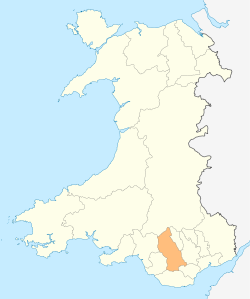Rhondda Cynon Taf
 |
|
| Geography | |
| Area - Total - % Water |
Ranked 13th 424 km² ? % |
|---|---|
| Admin HQ | Clydach Vale |
| ISO 3166-2 | GB-RCT |
| ONS code | 00PF |
| Demographics | |
| Population: - Total (2007 est.) - Density |
Ranked 2nd 233,700 Ranked 7th 551 / km² |
| Ethnicity | 98.9% White. |
| Welsh language - Any skills |
Ranked 13th 21.1% |
| Politics | |
 Rhondda Cynon Taf Council |
|
| Control | Labour |
| MPs |
|
| AMs |
|
Rhondda Cynon Taf, or RCT, is a county borough in the south of Wales.
The county borough borders Merthyr Tydfil and Caerphilly to the east, Cardiff and the Vale of Glamorgan to the south, Bridgend and Neath Port Talbot to the west and Powys to the north. Its main towns are Aberdare, Mountain Ash, Pontypridd and Porth. Rhondda Cynon Taf is the second-most populous local authority area in Wales.
See List of places in Rhondda Cynon Taf for a list of towns and villages. The most populous town in Rhondda Cynon Taf is Aberdare with a population of 31,619 (1991 Census).
Contents |
History
The county borough was formed on 1 April 1996, by the merger of the former Mid Glamorgan districts of Rhondda, Cynon Valley and Taff-Ely (with the exceptions of Creigiau and Pentyrch, which were added to Cardiff). Its name reflects all these, and thus also the rivers Rhondda, Cynon and Taff.
Industry
The district developed from the discovery and mining, primarily for export, of high-quality Welsh coals, such as steam coal, via Cardiff and Barry docks. The landscape was dominated by coal-waste heaps and deep mine pit-heads. Many of the roads are lined with semi-ribbon development of closely packed Victorian terraces of houses which have given the Rhondda valleys their distinctive appearance. In the nineteenth century the Rhondda had over 60 mines.
As deep mines closed, a number of very large open-cast coal mines were created and remain in operation, especially towards the north of the area.
The Welsh Development Agency, which was formed in 1976 to help reverse the economic down-turn in Wales caused by the recession in both the coal and steel industries, was very active in the Rhondda Cynon Taf area in supporting and encouraging industrial and commercial regeneration. Recent investment in the area has included the Dragon International Film Studios, on the site of Llanilltyd open-cast mine. This project is headed by Sir Richard Attenborough and will comprise TV studios, editing suites and a large film studio complex. The location of the project has led it to become known locally as "Valleywood", even though the Welsh valleys are some miles away.
A Rhondda Cynon Taf business club is run by the Council in conjunction with its patrons.[1]
Environment
The coal industry has had major adverse impacts on the quality of the environment, such that most of the rivers were severely polluted to the exclusion of all fish life. Recent decades have shown great improvement with the return of salmon recorded in the River Taff and the River Rhondda but the continued presence of man-made obstacles in the rivers is inhibiting regeneration of their pre-industrial numbers and condition.
The chemical industry has also had adverse effects due to the dumping of toxic waste in the now disused Brofiscin Quarry in the village of Groesfaen. Dumping took place over a 7-year period between 1967 and 1973 by the Monsanto Company. It is estimated that the cleanup costs could be more than £100 million. A Dr Papageorge, formerly Monsanto's chief scientist, estimates that between 60,000 and 80,000 tonnes of PCB contaminated wastes were dumped there.[2]
Government
The area is governed by Rhondda Cynon Taf County Borough Council from headquarters in Clydach Vale.
Twinning
Towns that have twinning arrangements in Rhondda Cynon Taf are:
Pontypridd -
 - Nürtingen, Baden-Württemberg (Germany)
- Nürtingen, Baden-Württemberg (Germany)
Aberdare -
 - Ravensburg, Baden-Württemberg (Germany)
- Ravensburg, Baden-Württemberg (Germany)
References
- ↑ Business Club website
- ↑ John Hughes; Pat Thomas (May 2007). "Burying The Truth". The Ecologist 37 (4): 33–63.
External links
- Rhondda Cynon Taf Unitary Authority homepage
- Rhondda Cynon Taf Online news portal
- Rhondda Cynon Taf at the Open Directory Project
|
||||||||||||||||||||
|
||||||||||||||||||||||||||||||||||